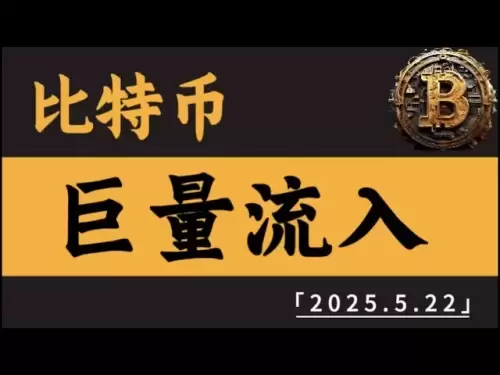 |
|
 |
|
 |
|
 |
|
 |
|
 |
|
 |
|
 |
|
 |
|
 |
|
 |
|
 |
|
 |
|
 |
|
 |
|
Cryptocurrency News Articles
South Korea Is Heading Into a High-Stakes Presidential Election on June 3
May 21, 2025 at 03:55 pm
input: South Korea is heading into a high-stakes presidential election on June 3 to choose Yoon Suk Yeol’s successor. Like the US, the nation's estimated 15 million crypto investors
South Korea is set for a crucial presidential election on June 3, with candidates vying for the vote of Generation MZ—millennials and members of Generation Z.
These young voters, known for their tech savviness and interest in new investment trends, are also the main drivers of the nation’s crypto market. Together, the estimated 15 million crypto investors in South Korea, constituting at least 30% of its population, form a pivotal voting bloc.
Accordingly, presidential candidates are integrating digital asset policy proposals into their platforms to win over this segment of voters.
The candidates’ proposals come amid increasing demand for regulated investment products and financial inclusion.
Moreover, institutions are largely restricted from entering the crypto market, and the lack of spot crypto ETFs in Korea—despite their availability in the U.S.—has limited options for diversified investing.
Two Frontrunners Offer Pro-Crypto Platforms
Local media reports that the two frontrunners—Lee Jae-myung from the Democratic Party and Kim Moon-soo from the People Power Party—lead the charge with pro-crypto platforms.
Both candidates have reportedly pledged to legalize spot crypto ETFs (exchange-traded funds), a move currently banned under Korean law. These financial instruments would enable investors to gain exposure to Bitcoin and other digital assets through traditional stock markets.
“All three major South Korean presidential candidates support Bitcoin ETFs and institutional investment. Currently, Bitcoin ETFs and institutional investments are banned in Korea. 100% volume comes from retail,” noted Ki Young Ju, CEO of CryptoQuant, in a recent post on X.
According to The Korean Herald, Lee Jae-myung further distinguishes his campaign by proposing to develop a won-backed stablecoin market. The candidate aims to reduce reliance on foreign stablecoins like USDT and USDC and curb capital outflows.
“We need to establish a won-backed stablecoin market to prevent national wealth from leaking overseas,” read an excerpt in the report, which cited Lee during a policy discussion with economic content creators.
South Korea currently prohibits domestic stablecoin issuance. However, Lee’s plan would introduce a regulatory path under the upcoming Digital Asset Basic Act.
The proposed legislation, expected to be tabled this week, will cover digital assets’ legal status, issuance, and circulation. It will also require stablecoin issuers to register with the Financial Services Commission (FSC) and hold at least 50 billion won in reserves.
According to the report, domestic crypto exchanges recorded 56.8 trillion won ($40.8 billion) in outflows between January and March alone. Nearly half of these were tied to US dollar-based stablecoins.
However, critics warn of potential macroeconomic risks, citing the privilege of money creation being conferred on the private sector.
“Stablecoins are essentially another form of banking, creating money out of nothing,” Shin Bo-sung, senior researcher at the Korea Capital Market Institute, reportedly stated.
Disclaimer:info@kdj.com
The information provided is not trading advice. kdj.com does not assume any responsibility for any investments made based on the information provided in this article. Cryptocurrencies are highly volatile and it is highly recommended that you invest with caution after thorough research!
If you believe that the content used on this website infringes your copyright, please contact us immediately (info@kdj.com) and we will delete it promptly.



























































